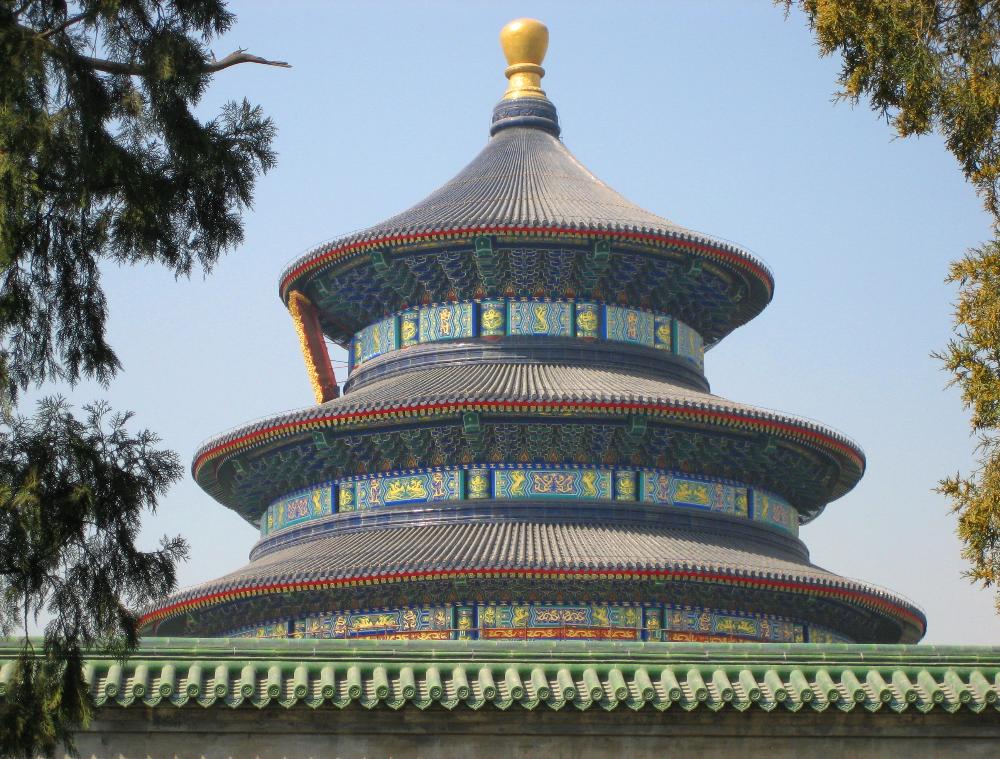
Where We Be
| Temple of Heaven -- Beijing, China |
A short walk from Tian-Tan Park brings us to the
Temple of Heaven, built in 1420 AD during the
Ming Dynasty. The centerpiece of the complex,
the Hall of Prayer for Good Harvests, is closed
for renovations on the inside, but we can still
get good views outside. It is a lovely structure:
circular in shape, three stories tall, with three
tiers of blue-tiled roofs. Like a wedding cake,
each tier is smaller than the one beneath it.
The amazing thing is that the entire wooden
structure was built without using a single nail.
We reach the Circular Altar, a slightly raised
dais where the emperor stood each winter
solstice to offer sacrifices to heaven and pray
for a bounteous harvest. Every tourist simply
has to stand on this spot and imagine, just for a
moment, what it would have been like to be
Emperor of China. It's a thrill knowing you're
standing exactly where he would have stood.
Temple of Heaven, built in 1420 AD during the
Ming Dynasty. The centerpiece of the complex,
the Hall of Prayer for Good Harvests, is closed
for renovations on the inside, but we can still
get good views outside. It is a lovely structure:
circular in shape, three stories tall, with three
tiers of blue-tiled roofs. Like a wedding cake,
each tier is smaller than the one beneath it.
The amazing thing is that the entire wooden
structure was built without using a single nail.
We reach the Circular Altar, a slightly raised
dais where the emperor stood each winter
solstice to offer sacrifices to heaven and pray
for a bounteous harvest. Every tourist simply
has to stand on this spot and imagine, just for a
moment, what it would have been like to be
Emperor of China. It's a thrill knowing you're
standing exactly where he would have stood.
| What a gorgeous building! Twice a year the Emperor and his retinue would travel from the Forbidden City across Beijing to the Temple of Heaven, where the Emperor would personally pray for good harvests. The slightest mistake on his part could doom the harvest. |
| Built without a single nail! This is the inside of the Imperial Vault of Heaven, a smaller temple that resembles the Hall of Prayer for Good Harvests. |
| Posing with our national guide, Tony, and our Beijing city guide, Wen -- both terrific! |
| Robin stands on a round slate called the Heart of Heaven -- exactly where the Emperor stood when praying for good harvests. Empress Robin, we salute you! |
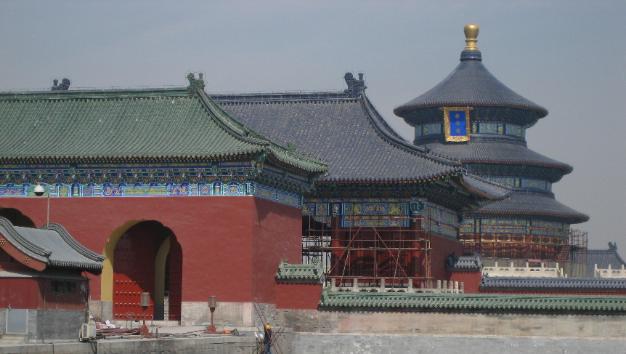
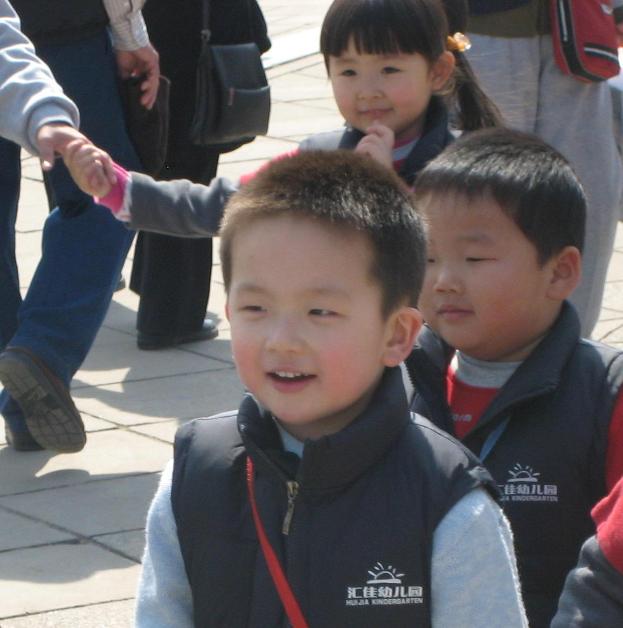
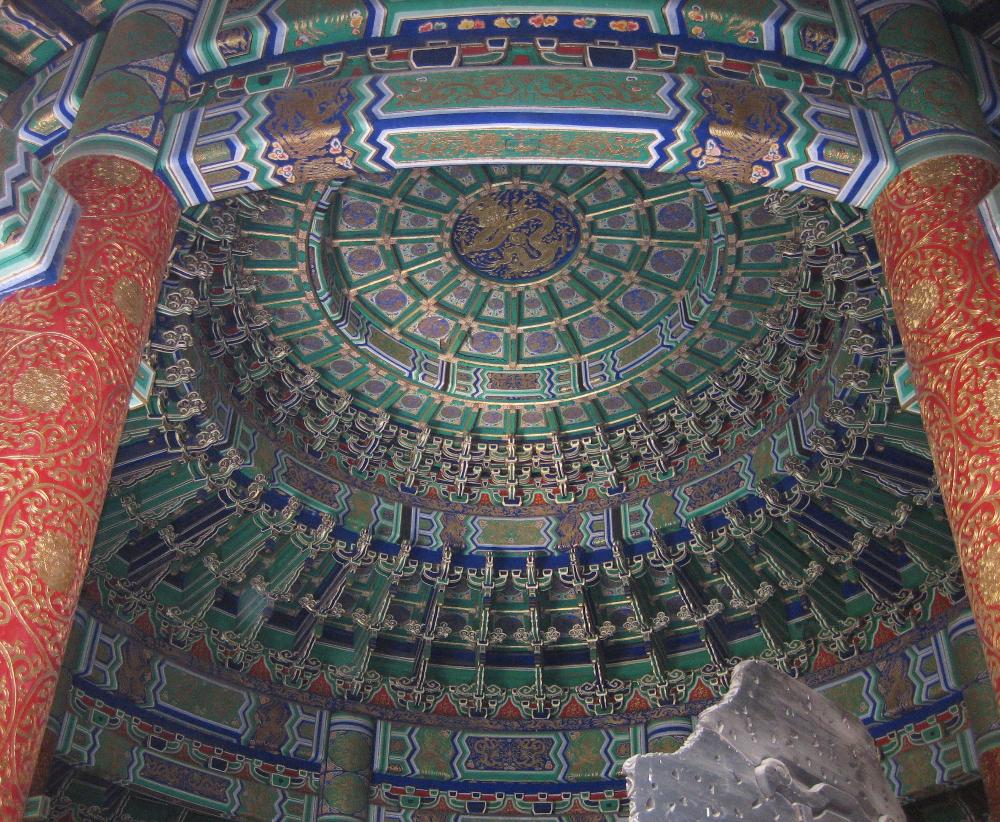
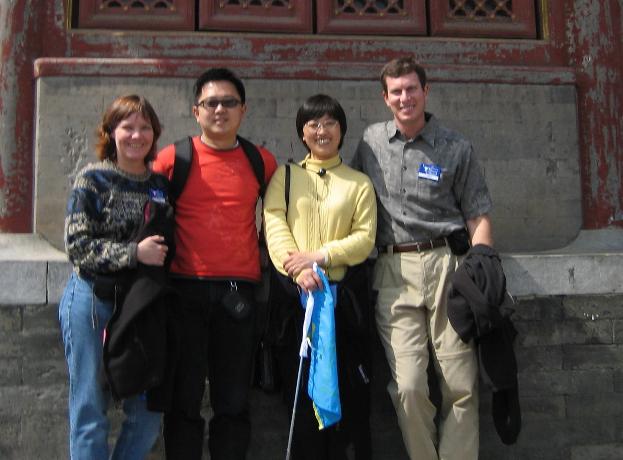
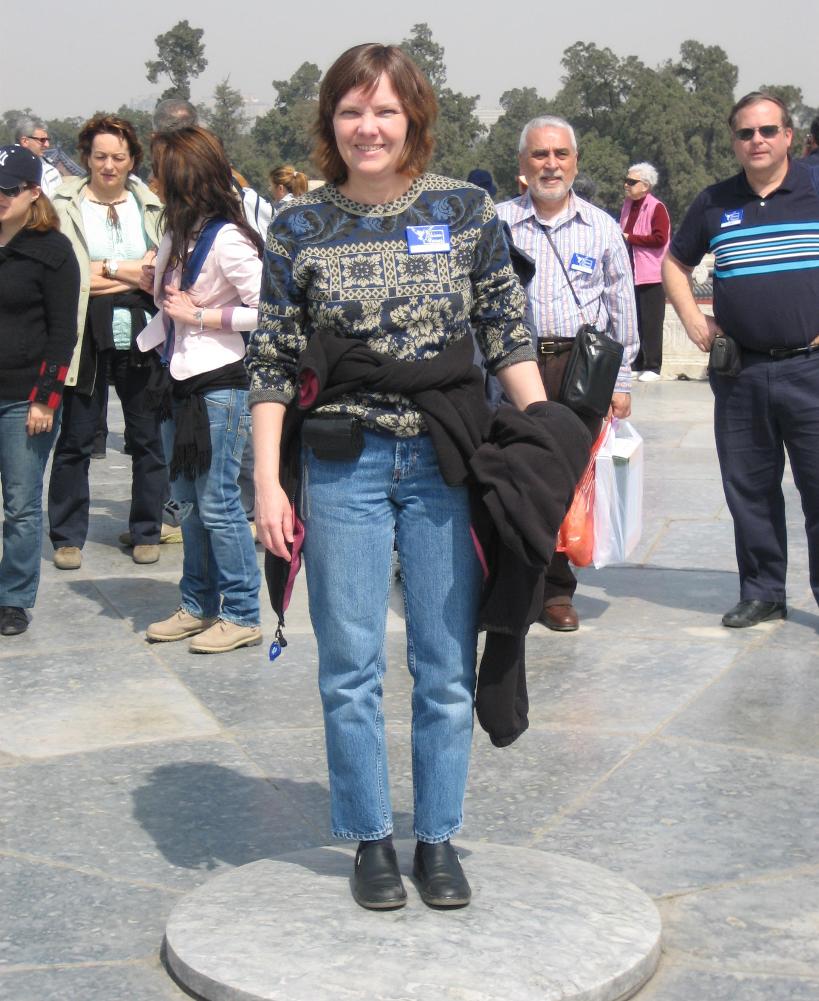
| The circular Temple of Heaven is our final stop in Beijing. Lightning struck the original wooden building and burned it down in 1889, so this is a reconstruction. |
| China's one-child policy means only children are doted upon by both parents and grandparents |
| Bus Chat #3: On Asking Permission to Get Pregnant |
During the drive back, our group asks lots of
questions about the one-child policy in China.
Wen tells us women in China who want to get
pregant need to get permission from the local
government first. “You need to let your local
committee know in advance.” This strikes us as
amusing but she is in earnest. She herself got
in trouble for not notifying the local committee
before she got pregnant and had to pay a fine
and fill out a lot of paperwork as a result.
What happens if you have more than one child?
If you live in a city, you are heavily taxed and
face social stigma. Your second or third
children may not be able to attend school or get
official registration cards, drivers licenses, and
so on, making it very hard for them later in life.
However, if you live in the countryside and your
first child is a girl, you can try again for a boy.
Male children are considered vital to doing
farm work and are expected to care for their
elderly parents later in life. But if the second
child is a girl, too bad, you get no more chances.
What if a woman becomes pregnant again
unexpectedly? She usually has an abortion,
Wen tells us matter-of-factly. Some women in
the countryside get an abortion as soon as the
doctor tells them the fetus is female. The result:
there are now significantly more males in China
than females. “This has become a big problem,”
Wen says. “Men of marrying age, especially in
the countryside, have to vie hard for the atten-
tions of a limited number of females of marrying
age and pay large dowries to win a bride.”
What about divorce and the one-child policy?
“Even if a husband and wife get a divorce, both
the man and the woman can still only have one
birth between them -- so for a man who
remarries, his new wife cannot have a child of
her own.” We’re also surprised to learn that
many modern Chinese who live in the cities opt
for no children at all because of the expense of
raising them -- yet another stark difference
between city and country life in China.
Wen points out that the one-child policy only
applies to Han Chinese, and not to minority
populations in China, so the Han are actually
harder on themselves in this regard than they
are on the minorities. Since China's current
population is 1.3 billion, it’s understandable why
they're trying so hard to limit population growth.
But it is strange to see so many children in our
travels and realize that practically none of them
have brothers or sisters. “As only children, they
tend to be spoiled rotten by their parents and
grandparents,” Wen says. We certainly see with
our own eyes how doted upon children are in
China. Parents and grandparents walk with
them hand-in-hand in parks, carry them in their
arms, and spend large sums of money to send
them to the best kindergartens and schools.
questions about the one-child policy in China.
Wen tells us women in China who want to get
pregant need to get permission from the local
government first. “You need to let your local
committee know in advance.” This strikes us as
amusing but she is in earnest. She herself got
in trouble for not notifying the local committee
before she got pregnant and had to pay a fine
and fill out a lot of paperwork as a result.
What happens if you have more than one child?
If you live in a city, you are heavily taxed and
face social stigma. Your second or third
children may not be able to attend school or get
official registration cards, drivers licenses, and
so on, making it very hard for them later in life.
However, if you live in the countryside and your
first child is a girl, you can try again for a boy.
Male children are considered vital to doing
farm work and are expected to care for their
elderly parents later in life. But if the second
child is a girl, too bad, you get no more chances.
What if a woman becomes pregnant again
unexpectedly? She usually has an abortion,
Wen tells us matter-of-factly. Some women in
the countryside get an abortion as soon as the
doctor tells them the fetus is female. The result:
there are now significantly more males in China
than females. “This has become a big problem,”
Wen says. “Men of marrying age, especially in
the countryside, have to vie hard for the atten-
tions of a limited number of females of marrying
age and pay large dowries to win a bride.”
What about divorce and the one-child policy?
“Even if a husband and wife get a divorce, both
the man and the woman can still only have one
birth between them -- so for a man who
remarries, his new wife cannot have a child of
her own.” We’re also surprised to learn that
many modern Chinese who live in the cities opt
for no children at all because of the expense of
raising them -- yet another stark difference
between city and country life in China.
Wen points out that the one-child policy only
applies to Han Chinese, and not to minority
populations in China, so the Han are actually
harder on themselves in this regard than they
are on the minorities. Since China's current
population is 1.3 billion, it’s understandable why
they're trying so hard to limit population growth.
But it is strange to see so many children in our
travels and realize that practically none of them
have brothers or sisters. “As only children, they
tend to be spoiled rotten by their parents and
grandparents,” Wen says. We certainly see with
our own eyes how doted upon children are in
China. Parents and grandparents walk with
them hand-in-hand in parks, carry them in their
arms, and spend large sums of money to send
them to the best kindergartens and schools.
